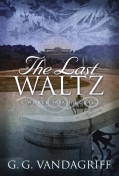BKMT READING GUIDES
The Last Waltz
by G. G. Vandagriff
Paperback : 608 pages
0 club reading this now
0 members have read this book
Introduction
In December 1913, the city of Vienna glitters with promises of the future for sought-after debutante Amalia Faulhaber. But life takes a dramatic turn when simmering political unrest escalates into the most deadly war the world has ever known. Amalia is devastated when her fiance, Baron Eberhard von Waldburg, breaks off their engagement to return to his native Germany and obligatory military service. But she soon discovers that her passion for democracy in an increasingly fascist world has put everything she loves in danger. Her family torn apart and improvished by the war, Amalia must now choose between an idealistic young Polish doctor, who shares her political views, and the wealthy Baron von Schoenenburg, an Austrian Cabinet minister who promises to provide safety and security in a violent, tumultuous time. Reminiscent of Gone with the Wind, this epic novel explores the nature of human character and the elusive search for love and peace.
Excerpt
Traveling across the vast imperial courtyard of the Hapsburg Palace, Amalia appeared as a mere speck of green against the snow. The matronly edifice, surrounded by cream pastry monuments, rose as a fantasy out of the white. Here an unbroken line of Hapsburg emperors had ruled over central Europe for half a millennium. This fact was there, buried deep in whatever consciousness of self the nineteen-year-old Amalia Faulhaber had, telling her much more than she realized about who she was—a Viennese. ...Discussion Questions
From the Author:Book Club Discussions for The Last Waltz
1.What faction of Viennese Society does each of the main characters represent?
2. How is what happens to them symbolic?
3. What do the following characters think of Amalia?
Eberhard
Andrzej
Rudolf
Uncle Lorenz
Trudi
Wolf
Louisa
4. How do the following characters change and develop through the novel?
Amalia
Andrzej
Eberhard
Rudolf
Grandmama Eugenia
Gretel Faulhaber
Wolf
5. What theme or themes would you say the novel portrays?
6. How is this novel relevant to our lives today?
7. Would change the ending? If so, why?
8. What does the ending symbolize?
9. What forces shaped each of Amalia's suitor's personalities?
Weblinks
| » |
Publisher's Book Info
|
| » |
Official Web Site of The Last Waltz
|
| » |
Author GG Vandagriff's Facebook Page
|
Notes From the Author to the Bookclub
Note from author GG Vandagriff: This is a book of a lifetime. I conceived the idea when I was studying at Stanford-in-Austria, and realized that this was a history that no one knew about. Today, even fewer people know about that great Austro-Hungarian Empire that ruled most of Central Europe for five hundred years. I wanted to tell the story, especially what happened between the wars and why the democratic experiment failed in Austria. Especially that in light of Santyana's statement about "those who do not study history are condemned to relive it" It took me forty years of writing and rewriting (though I published 7 books in between!) until I was finally satisfied. It slowly dawned on me that at twenty-seven years old, I had the makings of an epic here. But what did I know of true suffering—what it would mean to emerge from the glitter of fin de siecle to a dull post-war world? I also had a great desire to explore different aspects of marriage and love—what it is, what it isn't: the difference between narcissistic love and real love. I have learned over the course of a 38-year marriage that real love redeems the character. I am a different person than I was as a newlywed. And I learned of suffering by surviving a twenty-five year depression. During that time, I wrote and wrote until pieces of me were inside all of the characters. Writing was difficult. It wasn't until my fifties that I realized what was wrong with the book. Epics are not told from the point of view of a nineteen year old girl. I asked my self somewhat humorously, "What would Tolstoy do?" The answer was obvious. Tolstoy was an omniscient narrator. He told his epics from inside the heads of all his significant characters. After realizing that, the book became a deepening adventure of unfolding characters, and finally defined itself as an epic. I think that readers will agree that the theme of the book is this: The building of a strong and admirable character requires constant and difficult self-examination and then carrying out your decisions no matter what the consequences. The business of this fleeting life is building character. Your finest legacy does not consist of wealth, power, or fame, but of a life well-lived.Book Club Recommendations
Recommended to book clubs by 0 of 0 members.
Book Club HQ to over 90,000+ book clubs and ready to welcome yours.
Get free weekly updates on top club picks, book giveaways, author events and more








